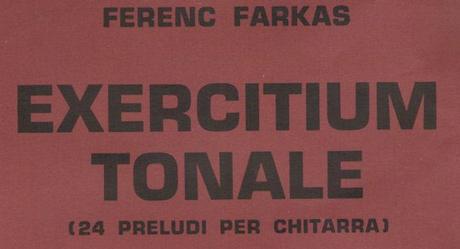
Fu con esplicito riferimento alla raccolta dei 24 Preludios per chitarra di Manuel María Ponce che il compositore ungherese Ferenc Farkas si accinse nel 1982 a scrivere il suo Exercitium tonale. Come Ponce – ma più di mezzo secolo più tardi – Farkas accettava il recinto della tonalità – con i suoi confini e con i suoi protocolli – per un esercizio di bravura compositiva che, non potendo ammettere la minima concessione alla banalità, si prospettava difficilissimo. I 24 Preludi composti dal maestro di Budapest, già allievo di Respighi, vanno intesi soprattutto come un saggio di perizia da parte di un autore per il quale l’armonia, il contrappunto e le forme musicali non hanno più segreti. I mille modi con i quali egli elude i procedimenti accademici e le furbizie del mestiere, implicando gli elementi delle varie tonalità senza mai esporne direttamente le parvenze più comuni e prevedibili, trovano un terreno molto favorevole nella scrittura chitarristica, di per sé stessa allusiva più che esaustiva. E Farkas, mimetizzando le sue armonie in un gioco di specchi e di rimandi, giunge spesso alla soglia del preziosismo. In un solo brano si lasciò andare – e lo fece deliberatamente – al deja entendu: il Preludio n. 12, in Fa minore, sottotitolato Cavatina – Omaggio a Donizetti, è una dolce melodia accompagnata che, nel contesto della raccolta, sembra fuggire all’indietro. Il fatto è che la richiesta di scrivere l’Exercitium tonale gli era stata rivolta a voce, in un ristorante di Bergamo alta…
English Version
English Version
It was with clear reference to the collection of 24 Preludios for guitar by Manuel María Ponce that the Hungarian composer Ferenc Farkas set to work on his Exercitum tonale in 1982. Like Ponce – but more than half a century later – Farkas took on the body of tones – with its limitations and protocols – for an exercise in compositional bravura which, without any concession to banality, was to prove to be of exceptional difficulty. The 24 Preludes by the composer who lived in Budapest and had studied under Respighi, are essentially a test in dexterity by an author for whom harmony, counterpoint and musical form held no secrets. The many ways in which he eludes academic procedures and the pitfalls of the trade, making use of the elements of the various tones without ever directly exposing their more common and predictable aspects, find fertile ground in composition for the guitar which, in itself, is more allusive than exhaustive. Also, by camouflaging his harmonies in a play of reflections and recollections, Farkas often borders preciosity. In one piece he deliberately resorted to déjà entendu: the Prelude no. 12, in F minor, subtitled Cavatina – Tribute to Donizetti, is a gentle melody with accompaniment which, in the context of the collection, seems to run away backwards. The fact of the matter is he was personally requested to compose the Exercitium tonale in a restaurant in Bergamo Alta…
[Translated by Translated.net]







